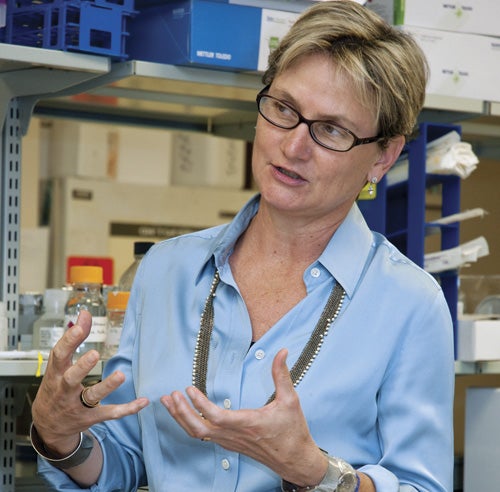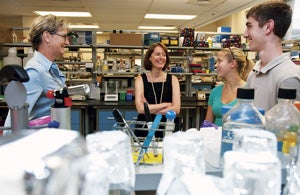A Shot In the Arm for Immunity

Vaccine Design Technology Flourishes at the Providence Campus
It didn’t take long for Annie De Groot to make a major impact at URI. Just a few months after being hired as a research professor of biotechnology in 2009, she was awarded a $13 million grant from the National Institutes of Health—one of the largest grants in URI history—to develop vaccines against emerging infectious diseases. The lab she had established at the Feinstein Providence Campus, called the Institute for Immunology and Informatics (or I-Cubed), soon tripled in size to accommodate about a dozen new researchers and students. And she began inviting scientists from around the world to Providence to learn to use the vaccine development tools she invented.
 It was an auspicious start, but not an unexpected one. De Groot came to URI after 13 years at Brown University, where she built a reputation for tuberculosis and HIV research, and from which she spun off her vaccine design technology into the start-up company EpiVax. She was also collaborating with local organizations to operate an HIV clinic in Mali and founded the Global Alliance to Immunize Against AIDS (GAIA) Vaccine Foundation.
It was an auspicious start, but not an unexpected one. De Groot came to URI after 13 years at Brown University, where she built a reputation for tuberculosis and HIV research, and from which she spun off her vaccine design technology into the start-up company EpiVax. She was also collaborating with local organizations to operate an HIV clinic in Mali and founded the Global Alliance to Immunize Against AIDS (GAIA) Vaccine Foundation.
“I came to URI because I saw that the institution appreciates the importance of translating science into applications for human use,” said De Groot, who earned her medical degree from the Pritzker School of Medicine at the University of Chicago, trained in internal medicine at New England Medical Center, and completed additional training in immunoinformatics and vaccine research at the NIH. “There’s no fear of biotechnology here; in fact professors are encouraged to work toward creating drugs or vaccines. The connection between basic laboratory research and biotech applications is embraced by the administration.”
“There’s no fear of biotechnology here; in fact professors are encouraged to work toward creating drugs or vaccines.”
De Groot, who helped establish national prison standards for the care of inmates with HIV and founded a free clinic in Providence, said that the objective of her lab is to make better, safer vaccines more quickly than traditional methods and to train the next generation of researchers.
“Vaccines are the most effective medical intervention ever discovered,” she said, “because you give them once, and then you’re protected for your lifetime for very little cost. We all remember reading about whole cities that were wiped out by disease in the past, but those events are not even in our vocabulary any more because of the availability of vaccines.”
Soon after founding the Institute, De Groot hired Denice Spero as co-director. An organic chemist by training, Spero worked in the pharmaceutical industry for 18 years discovering new drugs to treat asthma, multiple sclerosis, and rheumatoid arthritis. At Boehringer Ingelheim Pharmaceuticals, she built an organization to evaluate drugs before they go into clinical trials and weed out the ones that might fail. With a Boehringer colleague, she founded the nonprofit Developing World Cures to bring new drugs and vaccines to the developing world.
“We make designer vaccines using a suite of tools Annie developed that looks at how peptides bind to molecules that generate an immune response,” explained Spero. “It’s a way of designing vaccines in a computer. Instead of taking 20 to 25 years to go from concept to vaccine, we figured out how to do the informatics in months, not years.”
The Institute for Immunology and Informatics is focusing its work on what the scientists call neglected tropical diseases, like dengue fever, Chagas disease, and leishmaniasis. These are diseases that the World Health Organization defines as “primarily infectious diseases that thrive in impoverished settings, especially in the heat and humidity of tropical climates.” Approximately one billion people suffer from one or more of these diseases.
“In the developing world, people are dying from horrible diseases—worm and bacterial and viral diseases—that no one has addressed because the people are very poor and the diseases aren’t affecting those of us who have great health care,” explained Spero. “We believe we can solve this problem by making sure that the people in the developing world have appropriate vaccines.”
Added De Groot: “I have personal experience working in the field, vaccinating people, and seeing the terrible outcomes when vaccines are not available. In the developing world, vaccines are the simplest and most cost-effective intervention.”
Vaccines also act to engage the body’s natural defense mechanisms, she said. “I like the idea that we’re using a natural response that we all generate to protect against disease rather than taking a drug that is somewhat unnatural. Vaccines arm the natural immune system response, training you to protect yourself against something that your system hasn’t seen yet.”
While neglected tropical diseases get the most attention in the lab, the scientists are also working on vaccines against other diseases as well. They are collaborating with URI’s Entomologist Thomas Mather on tick-borne diseases, Assistant Research Professor Lenny Moise and Lifespan gastroenterologist Steven Moss on a gastric cancer vaccine, and Brown Medical School Associate Professor Stephen Gregory on hepatitis C and liver cancer vaccines.
Perhaps the most unusual project is one aimed at multi-pathogen diseases that could result from biowarfare agents. Spero said that many foreign governments are actively developing biowarfare agents, including smallpox, anthrax, and others she describes as “scary bacteria that you hope you will never meet.” De Groot is leading the lab’s effort to develop “single shot” vaccines that could fight three or four different bacteria at once and that could be used for military personnel.
“If you were in an anti-terror situation and a pathogen was released in Providence, how would you deal with that?” Spero asked. “Using our tools we could very quickly analyze the genome of the pathogen, evaluate what proteins it produces, and identify peptides to target in a vaccine.”
As important as this work is, De Groot and Spero say training the next generation of vaccine scientists is equally important.
“Developing vaccines is a long, continuous process, and you need to train new people to continue the work,” Spero said. “When Annie and I aren’t doing this work any more, today’s students will be the next generation making further innovations and new discoveries. The science works best when you work as a team.”
That team includes undergraduate and graduate students, primarily from URI, and recent graduates who work in the lab and who are assigned to particular research projects; summer fellows (undergraduates and local high school students) who attend classroom lectures in the morning and learn how to use analytical equipment in the lab in the afternoon; and young scientists from around the world who spend three weeks in January learning to use the lab’s vaccine development tools.
Danielle Aguirre, a graduate student who stumbled across the I-cubed lab by chance, originally considered enrolling in the Graduate School of Oceanography and is excited to be on the frontlines of vaccine development. She is working on a better vaccine delivery system that will more quickly initiate the immune reaction.
“I really wanted to be on the forefront of the gene-to-vaccine approach used here,” Aguirre said. “And I love the friendly atmosphere in the lab. It has turned into a second family for me. I really love it.”
That engaging atmosphere is one of the reasons that I-Cubed is a place where top-tier researchers want to work. The lab has already attracted one of the leading researchers on dengue fever, Alan Rothman, and De Groot said several more scientists “are waiting until the planets are aligned and they can move their grants here. We have a uniquely entrepreneurial system where you’re rewarded for bringing new research dollars into the lab. So we have a number of folks planning to join us as soon as they can,” she said.
That entrepreneurial focus was illustrated last summer when De Groot and Spero taught a workshop to vaccine scientists who want to start their own businesses. As a result, three new companies are actively looking for funding and lab space in the Providence area.
As dedicated and skilled as the I-Cubed directors are, they both give a great deal of credit for the success of the lab to Professor Greg Paquette, director of biotechnology programs, and Associate Professor Ed Bozzi, coordinator of the University’s Biotechnology Manufacturing Program.
“We’re thrilled to be working with Ed and Greg and the rest of the team here at the Providence Campus,” De Groot said, “because they are so focused on getting people engaged in biotechnology, from kindergarten to the master’s degree level. They export what we do here and make it accessible to people. This place is really focused on the next generation, and Denice and I feel so lucky to be part of that.”
The bottom line for De Groot and Spero, however, is a desire to provide people around the world with access to the means to improve their health.
“Some people make great food, some write great books,” De Groot said. “We want to make great vaccines and improve human health everywhere in the world.”
By Todd McLeish
 Home
Home Browse
Browse Close
Close Events
Events Maps
Maps Email
Email Brightspace
Brightspace eCampus
eCampus


